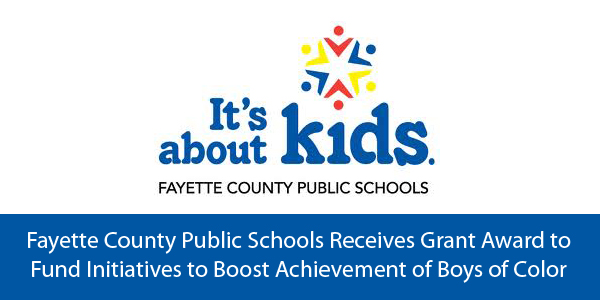Fayette County Public Schools Receives Grant Award to Fund Initiatives to Boost Achievement of Boys of Color
Fayette County Public Schools Superintendent Manny Caulk has unveiled a multi-faceted approach with the goal of eliminating the racial achievement gap that has plagued the district for decades.
With funding from a $600,000 grant from the William R. Kenan, Jr. Charitable Trust, the school district will establish an Office for Educating Boys of Color, the first of its kind in the state.
The grant will cover the cost of expanding existing programs that have a track record of success and piloting new initiatives to help black and Hispanic boys.
Each of the efforts is directly aligned to specific strategies in Caulk’s “Blueprint for Student Success: Achieving Educational Excellence and Equity for All” released in May.
“This is a great day for the Fayette County Public Schools,” Caulk said. “We are done studying problems, calling for task forces and shaking our heads at the data. Today we stand before our community to say we will no longer allow a child’s demography to determine his destiny.”
On measures of academic success, young men of color have lower levels of proficiency in Kentucky reading and math assessments than their white peers, regardless of socio-economic status, special needs or native language.
The Kentucky Performance Rating for Educational Progress currently shows that 28% of males of color scored proficient in math and 33% scored proficient in reading. In comparison, 61% of white males were proficient in math and 67% were proficient in reading.
Nearly three in four male students of color do not meet the ACT benchmark score of 22 that the University of Kentucky suggests students need to succeed, while two out of three white males do.
Boys of color are more likely to be suspended or drop out of school than their white counterparts and less likely to be placed in gifted and talented or advanced tracks.
“There are departments in our school district for gifted and talented students, for students with special needs and for students who have a native language other than English,” Caulk said. “It is time for us to acknowledge that this population of our students also warrants special attention.”
Racial disparities have been an issue in the Fayette County Public Schools going back to 1972, when a federal judge ordered the school district to integrate its schools. A decade later, the Lexington Human Rights Commission charged that the district failed to correct racial imbalance. In 1985, a school district study found black students in Fayette County were more likely than whites to be placed in special education classes, punished and suspended from school, and less likely to be placed in gifted programs.
Over the years, many groups have been formed to study achievement disparities and make recommendations to the school board, including a 1988 “Equality in Education Task Force,” a 1993 “Equity Task Force” that led to the establishment of the Equity Council in 1994, and the 2002 “One Community, One Voice” blue-ribbon panel.
Previous efforts have not led to any significant changes in student outcomes.
“Since joining the Fayette County Public Schools less than a year ago, I have seen and heard a great deal of frustration in the community,” Caulk said. “The data has shown for years that we needed a comprehensive intentional strategy to address the needs of our boys of color. We believe this is a game changer.”
Caulk outlined six major projects that will be the foundation of the work, two at the elementary school level, two at the middle school level and two at the high school level. Work will initially begin at the district’s eight “partnership zone” schools in Lexington’s north-end.
The “Real Men Read,” program will roll out at the elementary school level, recruiting men to serve as mentors and spend time reading with the boys. Students will receive books through this partnership to increase their access to reading materials at home.
At the middle school level, after-school tutoring programs will be established three days a week. The Alpha League concept, designed to empower and inspire young males to develop leadership skills through educational activities, community service, character development and mentoring, will be expanded to all district middle schools.
The district will begin exploring the creation of a dropout prevention program that provides relevant job-based learning for students who have not been successful in a traditional learning environment.
The second high school initiative will provide ACT prep and college readiness support, as well as targeted assistance for seniors who scored lower than a 22 on the ACT to help them prepare for college.
“While we recognize and honor the work that has gone on in the past, we must acknowledge that this grant represents the most significant investment to date aimed at removing these barriers,” Caulk said.
“We know that for many of our students, education is a pathway to a better life. This is a collaborative, proactive response to ensure that ALL students have a chance to fulfill their unlimited potential.”
Work will begin immediately, Caulk said. “Our community will be able to track our efforts and hold us accountable for success.”

